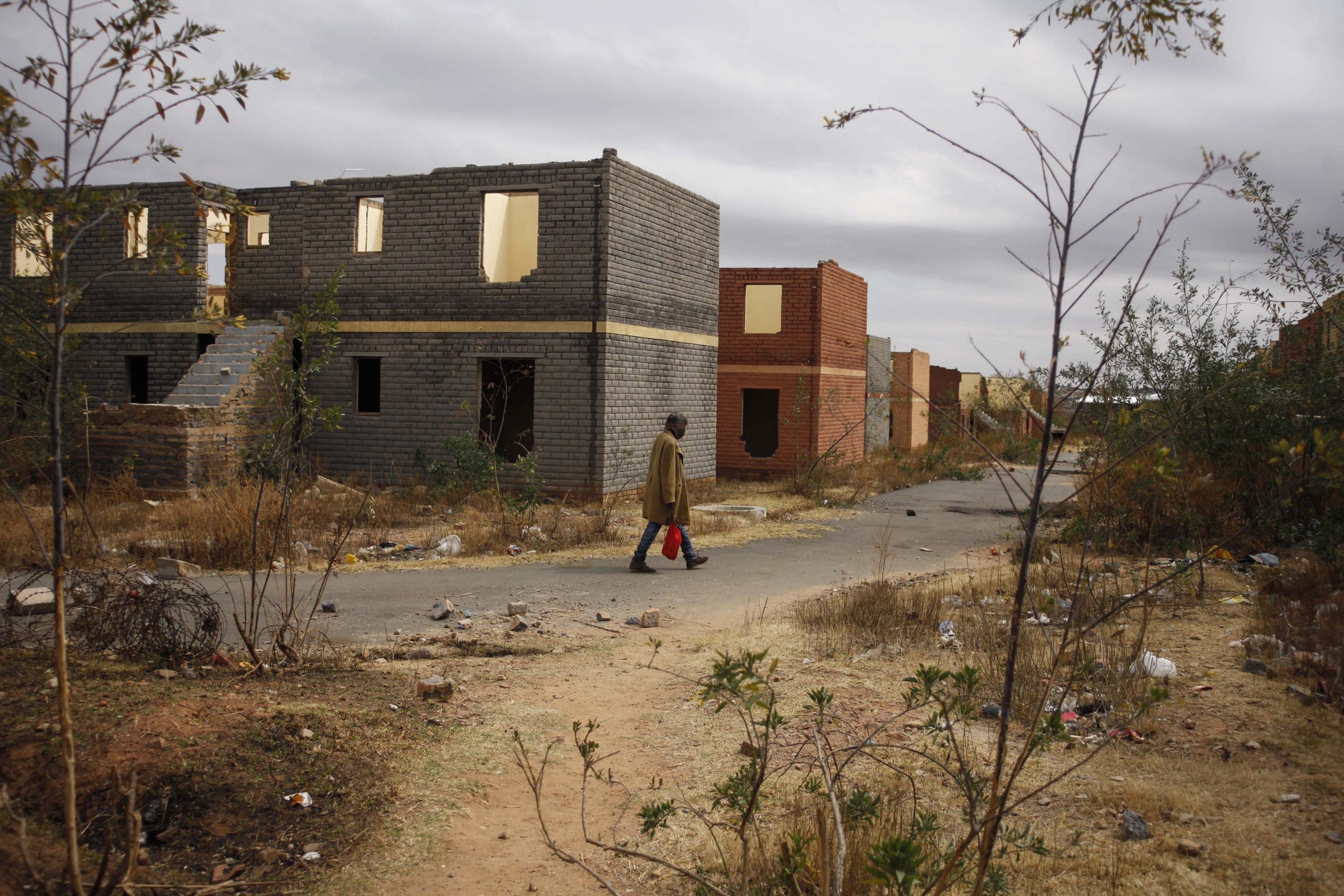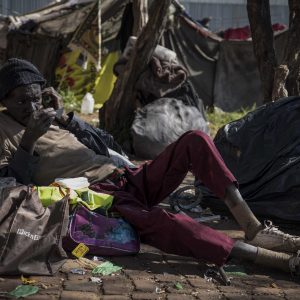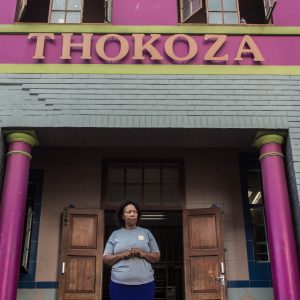Photo Essay | City of Joburg ring-fences housing
In Roodepoort, residents have been evicted after occupying seemingly abandoned City-owned flats while in Soweto, stripped units are kept empty by the City’s security guards.
Author:
2 October 2020

Fleurhof eviction
It’s Wednesday afternoon, 12 August 2020, and the notorious Red Ants have just arrived at Fleurhof in Roodepoort. Most are in a jovial mood, singing and whistling as they make their way to the buildings. They are dressed in their traditional red overalls and face masks. Once given the go-ahead by their superiors, they charge into a nearby block of flats that has been declared “illegally occupied”.
Doors to units are kicked open or crowbars are used. Once inside, a quick search ensues. Two-plate stoves, mattresses, blankets, pillows, gas cylinders, chairs, tables, curtains and washing bowls are thrown out of windows or over balconies. Most items are destroyed or damaged in the process. Anger stirs in onlookers who watch the men from a distance. When the “clean up” is done, the Red Ants gather the piles of possessions and dump them in a nearby field before heading to another block of flats.

Four days before this incident, residents allegedly occupied the Fleurhof housing development units. They claimed that the units have been standing empty for five years since the project was completed. The flats consist of 10 411 units on a 440-hectare piece of land and are understood to be one of largest integrated housing development projects in Gauteng.
More residential units are supposed to be built in the near future and will provide housing to an estimated 83 000 people when complete. The units vary in affordability, with some comprising a small but decent open-plan kitchen and lounge, two bedrooms and a bathroom.
Minister of Human Settlements, Water and Sanitation Lindiwe Sisulu blamed criminals and opportunists for the “illegal land invasions”, saying that “law enforcement officials should act against those who illegally occupied private property and remove them so that invasions did not spread to other municipalities”.
The Red Ants are accompanied by the Johannesburg Metro Police Department (JMPD), the South African Police Service, a private security company, Bulls Security, and a few members of the South African National Defence Force for reinforcements, though they keep their distance from the action.

At the next block of flats, residents confront police. Some hold up their hands while others kneel, pleading for mercy in the middle of the street. The police warn the crowd to move, before firing rubber bullets. Everyone runs. An injured man is left lying on the ground before being helped to the other side of the street.
By the end of the day, 2 000 people are left in the cold, despite lockdown rules prohibiting evictions and making alternative accommodation arrangements mandatory. “The finding of alternative accommodation will not apply in this instance because the eviction was done after the immediate occupation,” said Wayne Minnaar, the JMPD spokesperson. The following week, another eviction takes place.
Soweto’s white elephants
Soweto has four housing projects that once were seen as revolutionary. The Gauteng Department of Human Settlements spent R230 million building new apartments in Meadowlands, Mzimhlophe, Dube and Diepkloof. The flats were completed between 2011 and 2012 and were strategically located so that dilapidated old apartheid-style hostels were hidden by the new flats. Most of these grand units are today unoccupied.
The problems began when the department and the City of Johannesburg wanted to address the terrible conditions in hostels. The City’s housing department says that a survey was done in the hostels and an assessment of beneficiaries was conducted. This led to rental units being built to deal with the housing problem in those areas.
During consultations, residents thought they would be beneficiaries of Reconstruction and Development Programme (RDP) houses once the project was complete. To their surprise, flats were built and they were later told that they would have to pay rent to live in them. Hostel dwellers rejected this offer, saying high unemployment and poverty made paying rent impossible.
Related article:
Dube
The once fully furnished units here no longer have roofing, windows, doors, electrical or plumbing materials. The bricks of the building are slowly disappearing. “It would have been a lesser evil if these units were invaded and occupied,” the DA Gauteng spokesperson for human settlements, Makashule Gana, said to the media when he visited in 2017.
Neo Goba, the deputy director of communications and stakeholder management in the City’s housing department, says, “The units were not allocated after being completed by [the] province mainly due to connection of services and occupation certificates. The units were not guarded and therefore the vandalism occurred.”
“My brother, I’m afraid of this place at night,” says a hostel dweller walking past the derelict flats and heading to Ndlovu Street. “I don’t pass here. I take a different route.”

Diepkloof
At the Diepkloof hostel, a concerned elderly woman says, “Bhuti uma nginguwe bengizo yiyeka lendaba. Ngoba uzobuza umuntu okungamelanga umbuze bese abona ubumnyama (My brother, if I were you, I would leave this issue because you might ask someone who might not take it kindly and you end up beaten unconscious).”
It is a Thursday morning. The sun has just come out of the clouds, welcoming the spring after bitterly cold weeks. The friendly woman is sitting on concrete close to the running communal tap she is sharing with a middle-aged man. They are both washing clothes. Not far away, children are playing football in the middle of the street while a driver cleans his taxi after an early-morning shift.
Related article:
“I do not understand why the units are still standing empty while many residents, including myself, are living in an appalling and crumbling building,” she says. A young man next to her nods.
“These units have been vandalised more than four times, but there is always money to fix them.” The units are supposedly unoccupied after three years, but during the chat, she whispers: “The flat units are now occupied even though I’m not sure if the right process was indeed followed.”
Goba says there was an issue with connecting to services and issuing completion certificates by the building control unit of the City of Johannesburg.

“We then appointed Joshco [Johannesburg Social Housing Company] to rehabilitate the units, and they are secured by them until they are handed over and ready for allocation. It has to be noted that the units were built as community rental units, not RDPs. The funding comes from COJ [City of Johannesburg] under council funding allocated for these hostels.”
The process of rehabilitating the hostel is being investigated and the report has not been finalised, Goba says.
Mzimhlophe
“I think the issue of corruption is killing us because we [ANC] have said we are defending the gains of our struggle but now we are doing the opposite,” says Mandla Khumalo*, who is wearing a faded ANC T-shirt with the face of former president Jacob Zuma.
The 48-year-old still lives at his grandmother’s house, which he shares with his nine siblings.
“This project started in 2007 but a man by the name of Siphithiphithi was already part of the development, even though his company was only registered around 2010. He died and other people took over, which caused anger within the community,” he says.
The housing department wanted to integrate the community of Mzimhlophe and the women hostel dwellers in the area. Eighty-four units were built with the understanding that hostel dwellers would use 42 while their dilapidated buildings were refurbished. The process was to continue until the more than 500 hostel units were transformed into family dwellings.

The women hostel dwellers would be the first beneficiaries while the Mzimhlophe residents would have to bring along proof of residence, pay slips and an identity document to verify they qualify for the rental units.
Like many other residents, Khumalo is unemployed and doesn’t qualify. His name is on the RDP housing waiting list that has been backlogged since 1998. “I … registered in Orlando five years before this project started but I lost my slip. Since then, I haven’t heard anything,” he says.
Related article:
Four years ago the project was halted, allegedly because two house units were built over a sewerage system and the buildings were not up to standard. “They have cracks and are a danger,” Khumalo says, adding, “people are not happy seeing houses that are unoccupied while they do not have houses.”
“Joshco took over from the incomplete process and followed a process of advertising within their approved panel of contractors, wherein qualifying contractors in terms of CIDB [Construction Industry Development Board] grading and cost estimate was allocated to complete the works,” Goba explains, adding that units will be allocated once the electricity and occupation certificates are finalised.
Meadowlands
Sewage from a burst pipe flows down a very congested street leading to a hostel. People walk up and down, as though not bothered by the smell. Three guys are seated outside a tiny tavern listening to loud maskandi music. At the corner, a group of young men play dice. Vehicles are moving very slowly to avoid bumping into pedestrians. It is just after 12pm.
Almost all the old houses have two or more shacks as rental spaces. From a distance, red roof tiles are visible in the landscape of eclectic houses. Close up, these tiles merge into beautiful units. The buildings are two- or three- storeys with brown brick walls. They are fenced with green palisades and security guards are visible, seated in teams at the main gates of the buildings. The units are empty.
Goba says four hostels in Mzimhlophe and Meadowlands were refurbished at the end of June this year. Work at another, the Nancefield Hostel, is under way.
* Not his real name.










